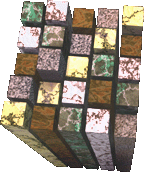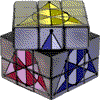|
|
 |
Handouts
|
Disclaimer: These notes have been prepared for distribution to students in my classes, and participants in local seminars, following a lower standard for proofreading than my publications. They vary in intended level from elementary to graduate student level. Also expect to find casual remarks, inside jokes, homework problems etc., intended for my students. Misprints are par for the course, but you can let me know when you find mistakes ( ) and if I have time, I will post corrections.
) and if I have time, I will post corrections.
General Advice for Students
- So You Want to Give a Math Talk. UW Math REU, June 22, 2010
- Some very basic pointers on summation notation
Proofs
- On learning to read and write proofs. Three examples of proofs
- Mathematical Induction
Algebra
- The field of rational numbers: an exercise in the use of equivalence classes
- A linear algebra refresher for later courses
- A very quick summary of what eigenvalues and eigenvectors are
- Numbers and Polynomials. Introducing polynomials as formal objects
- Division Algorithm for Polynomials; Euclidean Algorithm for polynomials, computation examples in Maple
- Extended Euclidean Algorithm for polynomials
- Newton and Lagrange Interpolation of Polynomials
- Equiangular Lines in ℝn: the absolute bound via the dimension of the space of d-homogeneous polynomials in n variables
- Basic notation, terminology and examples of ring theory
- Polynomials and power series: the formal viewpoint
- Homomorphisms, ideals and quotients in ring theory
- Introduction to complex numbers and the Fundamental Theorem of Algebra
- Introduction to fields
- Extensions of fields with applications to straightedge-and-compass constructibility
- Some consequences of field characteristic
- Free groups
- Algebraic closures of fields with an appendix on Zorn's Lemma
- Abstract Algebra I
Used as a text for our first-semester graduate abstract algebra course. Groups, rings and fields, culminating in the Fundamental Theorem of Galois Theory.
- Representation Theory
Ordinary representation theory of finite groups. Notes for one of the units in our graduate-level group theory course, culminating in the theorems of Frobenius (existence of Frobenius kernels) and Burnside (the pαqβ Theorem).
- Introduction to Cohomology beginning with algebra background
- Universal Coefficient Theorem for homology, beginning with algebra background
- The skinny on group cohomology
Combinatorics via Generating Functions
- Funny Dice: an introduction to generating functions. Some helpful Maple code is included
- Fibonacci numbers I and II: our next examples of generating functions
- Catalan numbers
- Counting walks
- Partition numbers and Pentagonal numbers
- Bell and Stirling numbers
- Counting necklaces via generating functions (see Bona's book)
- Selected applications of infinite series: generating functions and signal processing
Number Theory
- Review: basic definitions and properties of the integers
- Classifying Pythagorean Triples. A first proof in our course; I prefer this treatment to that in the Silverman textbook
- Using continued fractions to recognize rationals and quadratic irrationals from their decimal approximations
- CFRAC Factorization Method: An introduction to modern methods of integer factorization, with a small example implemented in Maple
- Dirichlet Series. Dirichlet's proof that there are infinitely many primes of the form 4k+1.
- Needles and Numbers: from the Buffon Needle problem to special values ζ(2n) of the Riemann zeta function
- The Basel Problem. Here we give a rigorous elementary proof that ζ(2) = π2/6.
- Quadratic Reciprocity
- Writing a number as a sum of two squares with Maple implementation
- Factorization in rings of algebraic integers
- Transcendence of e and of π
- Functional equation for the Riemann zeta function using the adèles to motivate the Euler factors
- A Taste of Galois Theory
- Computations in the p-adics
- Introduction to modern cryptography
- Modular exponentiation of large integers using Maple. Background for RSA and Diffie-Hellman
- Maple implementation of RSA encryption
- A first (very rough) working version of Cyclotomic Fields with Applications. Lecture notes for Fall 2018 course
Information Theory/Coding Theory/Entropy
- Data Compression using Huffman codes
- Entropy
- Error-Correcting Codes using a systematic version of the [7,4,3] binary Hamming code as an example
- The [7,4,3] binary Hamming code again: Alternative version with syndromes using linear algebra for encoding/decoding
- A sheet of qualitative examples comparing entropy of various information sources
- Reed-Solomon Codes
- Bell's Theorem via the CHSH game
Geometry
- A quick Overview of Geometry
- Affine Planes
- An application of finite geometry to experimental design
- Projective Planes
- On the role of the axiomatic method in plane geometry
- Inversive Planes
- Some straightedge and compass constructions, with Steiner's porism
- The real hyperbolic plane
- Incidence Geometry. Course notes for a Fall 2007 graduate course. Current revision: August, 2017
- The E8 Root Lattice and Conway's Ovoids
Exams
- Algebra Qualifying Exam, January 2005 (for our graduate students)
With solutions.
- December 2005 Putnam Exam with my solutions
- December 2006 Putnam Exam with my solutions
Logic/Set Theory/Topology
Warning: More pictures ahead of old white males wearing neckties
- My favourite problem. Only after thinking seriously about it, look at the comments, solution and generalization.
- Knot Theory and Alexander polynomials
- Cardinality from the Bernstein-Cantor-Schröder Theorem
- Introducing the Infinite: Why the distinction between countable and uncountable is of practical importance
- Infinite Dimensional Vector Spaces
- Transfinite Induction. Notes for UW seminar on Jan 20, 2009
- Separation properties in topology inclyding Urysohn's Lemma
- Ultrafilters and Tychonoff's Theorem
- Alternative proof of Tychonoff's Theorem by transfinite induction
- Ultraproducts
- The Tychonoff Plank
- Stone-Čech Compactification and Hindman's Theorem
- Construction of the Non-Standard Reals using ultrafilters
- The Hardin-Taylor Theorem on predicting the future
- Notes on Baire Category with applications (existence of an every-where-continuous-but-nowhere-differentiable function; also infinite permutation groups)
- Applications of logic to field theory
- Notes on Cherlin's proof that a generalised quadrangle with five points per line is finite. Includes background on order indiscernibles. Prepared for discussion with my friend Stan
 Under Construction
Under Construction
 / revised March, 2017
/ revised March, 2017






 ) and if I have time, I will post corrections.
) and if I have time, I will post corrections. Under Construction
Under Construction / revised March, 2017
/ revised March, 2017